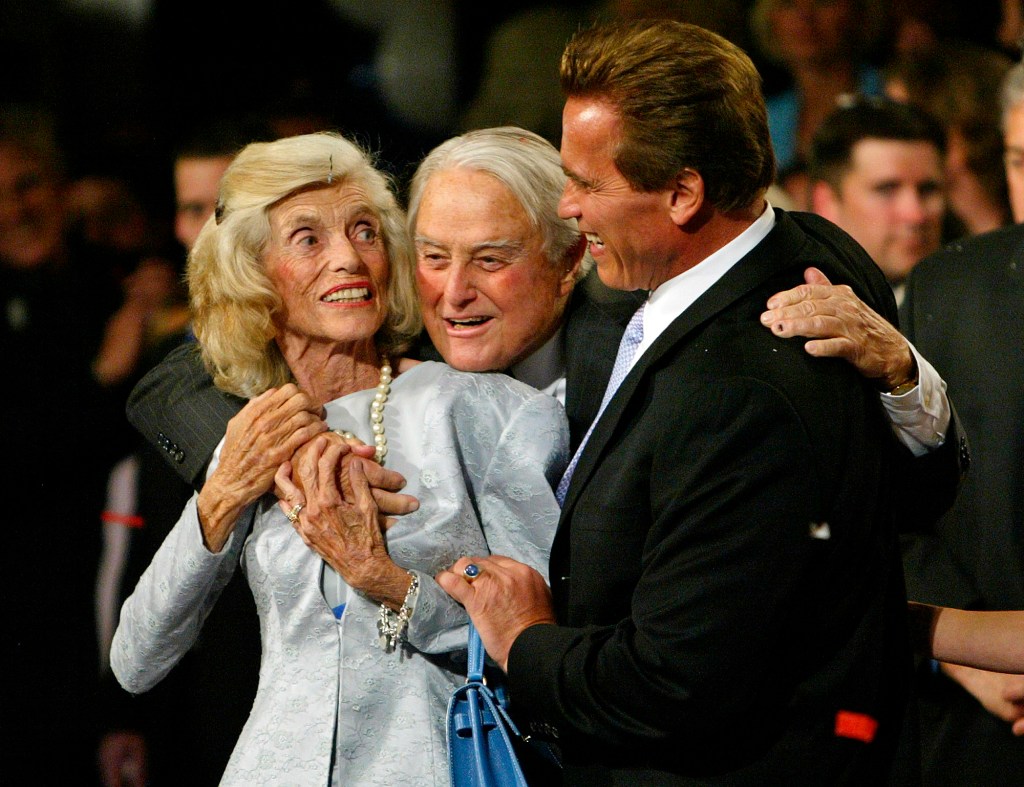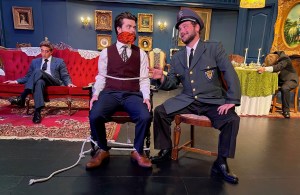Sargent Shriver is dead at age 95
Published 8:30 am Wednesday, January 19, 2011

- This Oct. 7, 2003 file photo shows Republican Arnold Schwarzenegger, right, being joined by in-laws Eunice Kennedy-Shriver, left, and Sargent Shriver following his victory in the California gubernatorial recall election in Los Angeles. Shriver, the exuberant public servant and Kennedy in-law whose singular career included directing the Peace Corps, fighting the "War on Poverty" and, less successfully, running for office, died Tuesday, Jan. 18, 2011. He was 95.
R. Sargent Shriver, the exuberant public servant and Kennedy in-law whose career included directing the Peace Corps, fighting the War on Poverty, ambassador to France and, less successfully, running for office, died Tuesday. He was 95.
Trending
Shriver, who announced in 2003 that he had Alzheimer’s disease, had been hospitalized for several days. The family said he died surrounded by those he loved.
One of the last links to President Kennedy’s administration, Shriver’s death comes less than two years after his wife, Special Olympics founder Eunice Kennedy Shriver, died on Aug. 11, 2009, at age 88.
The Kennedy family suffered a second blow that same month when Sen. Edward Kennedy died.
Speaking outside Suburban Hospital in Maryland, Anthony Kennedy Shriver said his father was “with my mom now,” and called his parents’ marriage a great love story.
At Eunice Shriver’s memorial service, their daughter Maria Shriver said her father let her mother “rip and he let her roar, and he loved everything about her.” He attended in a wheelchair.
The handsome Shriver was often known first as an in-law — brother-in-law of President John F. Kennedy and, late in life, father-in-law of actor-former California Gov. Arnold Schwarzenegger.
Trending
But his achievements were historic in their own right and changed millions of lives: the Peace Corps’ first director and the leader of President Lyndon Johnson’s “War on Poverty,” out of which came such programs as Head Start and Legal Services.
President Barack Obama called Shriver “one of the brightest lights of the greatest generation.”
“Over the course of his long and distinguished career, Sarge came to embody the idea of public service,” Obama said in a statement.
Within the family, Shriver was sometimes relied upon for the hardest tasks. When Jacqueline Kennedy needed the funeral arranged for her assassinated husband, she asked her brother-in-law.
“He was a man of giant love, energy, enthusiasm, and commitment,” the Shriver family said in a statement. “He lived to make the world a more joyful, faithful, and compassionate place. He centered everything on his faith and his family. He worked on stages both large and small but in the end, he will be best known for his love of others.”
In public, Shriver spoke warmly of his famous in-laws, but the private relationship was often tense. According to Scott Stossel’s “Sarge: The Life and Times of Sargent Shriver,” an authorized 2004 biography, the ebullient and charismatic Shriver was a faithful man amid a clan of womanizers, a sometimes giddy idealist labeled “the house Communist” by the family.
“He was never about personal accomplishments or personal celebrity except insofar as it helped him achieve his policy goals,” Stossel said. “He thought of public service more broadly than just holding elective office.”
After Kennedy’s assassination in 1963, President Lyndon Johnson called upon Shriver to run another program which then existed only as a high-minded concept: the War on Poverty, a part of the new president’s Great Society. Shriver’s willingness to work for Johnson, whose dislike for the Kennedys was well-known, was seen as betrayal by some family members, according to Stossel.
Shriver’s efforts in the Johnson administration demonstrated both the reach and frustrations of government programs: Head Start remains respected for offering early education for poor children, and Legal Services gave the poor an opportunity for better representation in court. But other Shriver initiatives suffered from bureaucracy, feuds with local officials and a struggle for funds as Johnson devoted more and more money to the Vietnam War.
In early 1968, with Shriver rumored to be on the verge of quitting, Johnson offered him the ambassadorship to France, a position he held for two years. He accepted it even though some family members wanted Shriver to support Sen. Robert Kennedy’s presidential candidacy instead.
In Paris, Shriver won many French fans, but he left the post for a job in private business not long after Nixon took office in 1969.
Like always, he aspired to national office, but at times was thwarted by the family.
Hubert Humphrey considered him for his running mate in the 1968 election, but family resistance helped Humphrey change his mind.
When Shriver finally became a candidate, the results were disastrous: He was George McGovern’s running mate in the 1972 election, but the Democrats lost in a landslide to President Richard M. Nixon.
McGovern recalled Tuesday how Shriver was the biggest morale booster on the campaign trail and even managed to raise his spirits the day after they lost so decisively.
“He came over and put an arm around me and said, ’Well, George we lost 49 states, but we didn’t lose our souls,”’ McGovern said in an interview from St. Augustine, Fla.
Four years later, Shriver’s presidential campaign ended quickly, overrun by a then-little-known Georgia governor named Jimmy Carter. His failures as a candidate left him with a reputation as a charming, but shallow salesman. (A “useless dingbat,” wrote Hunter S. Thompson in his classic “Fear and Loathing: On the Campaign Trail ’72”).
When McGovern drafted him to replace Sen. Thomas Eagleton of Missouri as his running-mate, Shriver was good humored that he had been McGovern’s seventh pick — including Ted Kennedy. He named his campaign plane “Lucky 7.”
In September 1975, Shriver joined an already crowded race for the 1976 Democratic nomination. But he dropped out in March 1976 after poor showings in the early primaries and never again sought office. Instead, he helped run the Special Olympics and advocated an end to the nuclear arms race.
“Sargent Shriver helped Special Olympics break down barriers around the world and with his knowledge and expertise in foreign affairs and different cultures, helped turn Special Olympics into the international movement it is today,” said Robert A. Johnson, president and CEO of the organization.
In 1994, Shriver received the Presidential Medal of Freedom, the nation’s highest civilian honor, from President Bill Clinton.
“He leaves behind an astonishing legacy of people helped, lives transformed, and communities improved,” Bill Clinton and Secretary of State Hillary Clinton said in a statement. “Through his work and his passion, he helped build a better America and a more humane world.”
His famous son-in-law, Arnold Schwarzenegger, called Shriver an inspiration.
“As someone who has always believed very strongly in the power of the body and the power of the mind and the power of will, Sargent taught me a new power: the power of the heart,” said Schwarzenegger, who is married to Maria Shriver.
Besides Maria and Anthony, the Shrivers also three more sons — Robert, Timothy and Mark. Mark Shriver was elected to the Maryland House of Delegates in 1995 and ran unsuccessfully for Congress in 2002. They also had 19 grandchildren.





